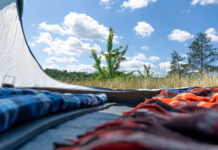 Name: William Lee
Name: William Lee
Year: Senior
Major: Psychology
Area of Study: Electives
Country: All around the globe!
While the majority of you were in class, I spent the last four months circumnavigating the entire world. My travels took me all over—the Bahamas, Dominica, Brazil, Ghana, South Africa, Mauritius, India, Singapore, Vietnam, Hong Kong, China, Japan and Hawaii. My advice to anyone who is considering traveling is to go now, go hard and don’t regret it. You’ll never see things the same way.
What traveling the world did for me was open my eyes to many of the misconceptions that (ignorant) Americans hold about developing countries. I expected to see poverty at its worst. I was ready to fight off thieves. I clenched onto my camera at the turn of every corner. But after sailing away from the first country, I rediscovered something that we often take for granted in America—the genuine and kind-hearted human being. On my adventure around the entire globe I’ve encountered the most gentle of strangers, the kindest of native locals and above all the happiest amongst the most impoverished. I encountered indigenous tribes in the Amazon and in Ghana, homeless children in Vietnam and India, and I witnessed the harsh lifestyles of the townships in South Africa. The sights I saw and encounters I had were reminders that poor people are not necessarily the worst of people. If there’s one thing I’ve learned after traveling to these 12 countries, it’s that people are genuinely friendly and not everyone poor and needy is out to screw you over.
It’s hard for me to pick out a favorite moment or place from my travels, but I can say that some of my most cherished moments were the interactions and conversations I had with the local peoples. They opened up their homes and their arms to us. They trusted us just as much as we needed to trust them. Most importantly, they were just as eager to learn from us as we were to learn about them.
Despite this, I still witnessed the painful realities of poverty and the fact remained that I couldn’t help them all. I’ve looked into the eyes of a starving mother and her child and apologized for not being able to help them. I’ve shaken hands with men who, despite our inability to feed every hungry child, thanked us tremendously for our small efforts. The feeling of leaving a place and its wonderful people knowing that life is not going to get any better for them while you are returning home to your life of privilege and relative affluence is a bitter one. So bitter that it forces you to contemplate whether or not you deserve the things that are given to you. Watching the news and reading about poverty in developing countries can only tell you so much. But once you’re on the receiving end of that tight, warm hug and find yourself guests in their homes eating their food and enjoying their hospitality, it’s a totally different experience that shatters your preconceptions and shifts your cultural lenses.
The beauty of a program like Semester at Sea lies not only in the significance of a cross cultural experience but it also allows for a window of opportunity to accomplish the things you may not ever get to do after starting a career and living a professional working life. It’s not difficult to comprehend that life is short and that, years from now it’ll be a whole lot easier to regret the things you didn’t do in your life rather than the things you did do.
In the past few months, the following have been crossed off my bucket list: sleeping in the Amazon rainforest, snorkeling in Mauritius, cage diving with great white sharks, climbing Table Mountain, cleansing what’s left of my soul in the holy city of Varanasi, exploring the Taj Mahal, eating Kobe beef in Japan, visiting the city of my ancestors in China and much more that I cannot mention. You can only learn so much from professors and textbooks before personal experience comes into play. I see travelling not just as a way to be free and enjoy your life, but as a way of opening your mind to new things and educating yourself through hands-on experiences.
Most Semester at Sea alumni will agree that the program did in fact change their lives. I, however, would not take it to that extreme. It’s more like Semester at Sea gave me a new outlook on life. I was right, most Americans do not travel. We do in the sense that we usually go somewhere to aimlessly gaze upon other Western marvels, to bask in the beauty of paradise or to brag to your Facebook friends about your check-in at the biggest club in the Bahamas. But my travels have helped me realize that if you really want to be away from home, engage with the people there and lose yourself in the culture. In all honesty, you are not truly experiencing any foreign place unless you are feeling uncomfortable on some level. When you are in a different place and you are with different people– nothing else matters. Eat the food that may give you diarrhea, ask the homeless man for directions, drink with complete strangers and embrace it. Traveling is not necessarily always about the destination. Half the fun for me was the journey of being lost and finding my way to the next city. Whether it’s jumping out of a plane in Australia or jumping out of a taxicab into the dark streets of Ghana, it all begins with stepping outside of your comfort zone. It will be hard but you’ll have to leave that little bubble of arrogance we call America. So has studying abroad helped me to grow in any way? I’m now more culturally sensitive, more geographically aware and have discovered my passion for adventure. Toss me out into Panama for the next two months with a backpack and some malaria pills and I’ll find my way to Belize. As a matter of fact, by the time you read this I’ll be gone again.
The opinions expressed in UCR Around the Globe belong solely to the author and do not represent those of the Highlander Editorial Board.








